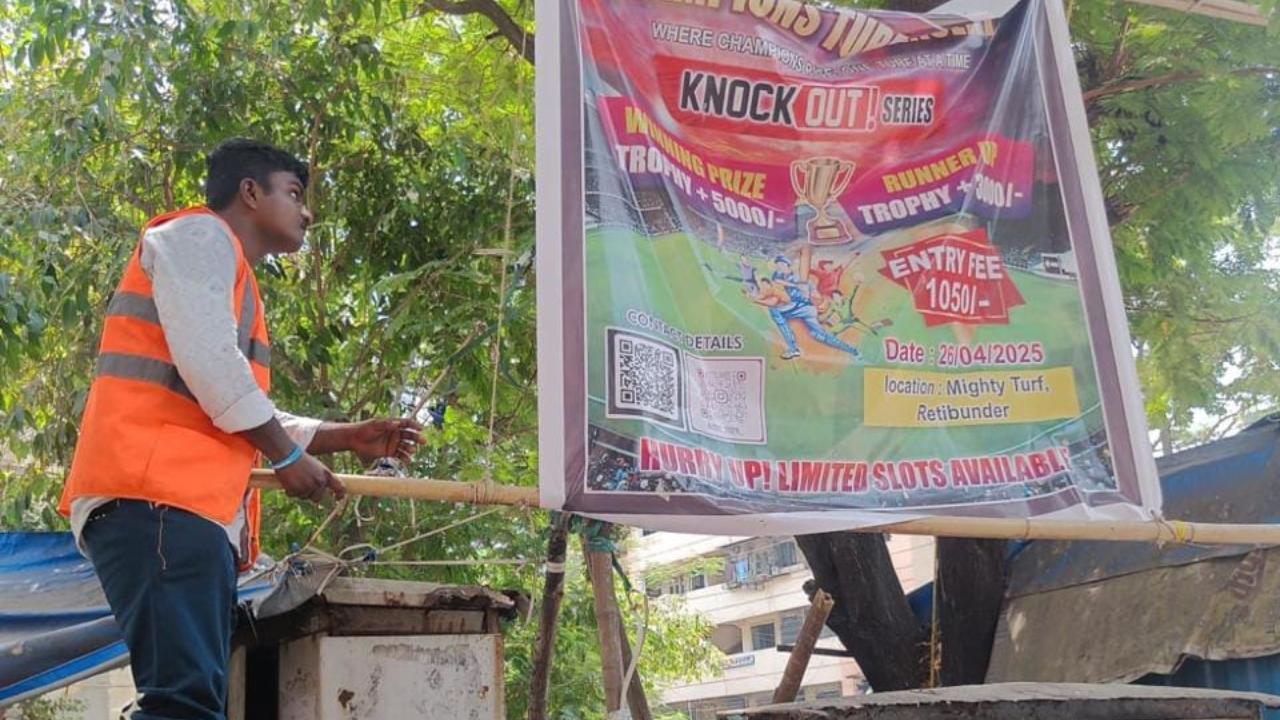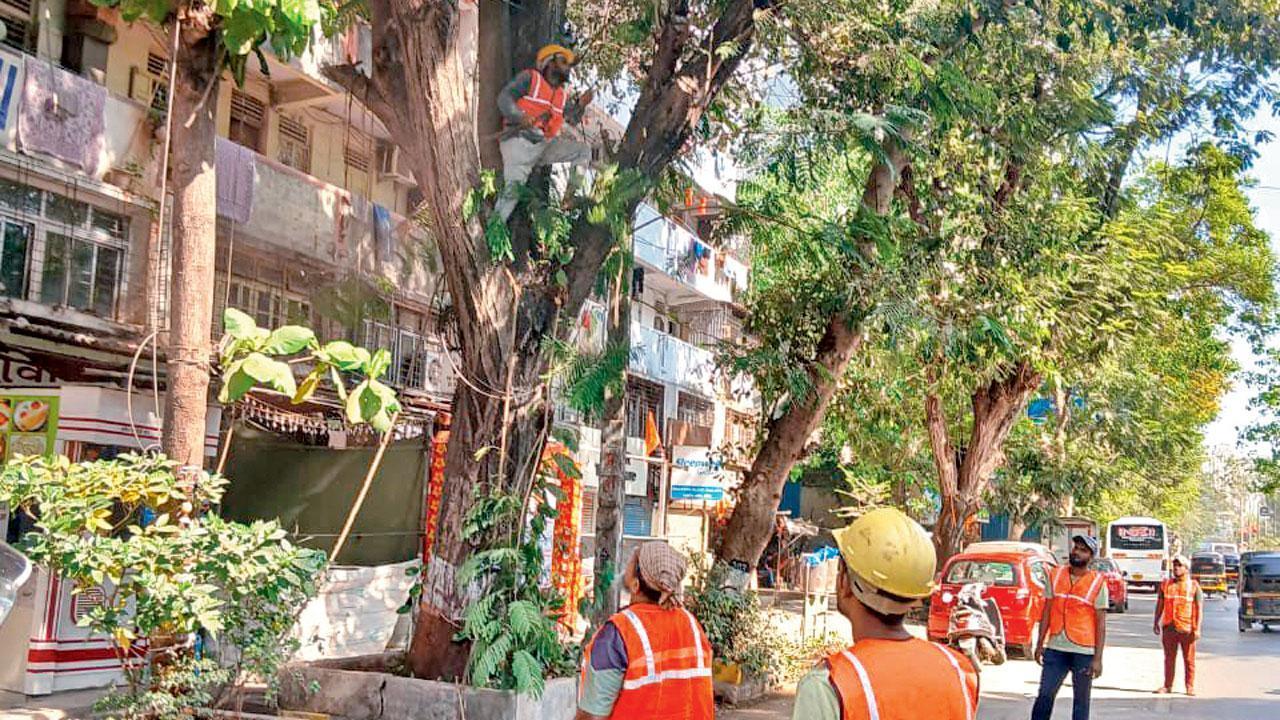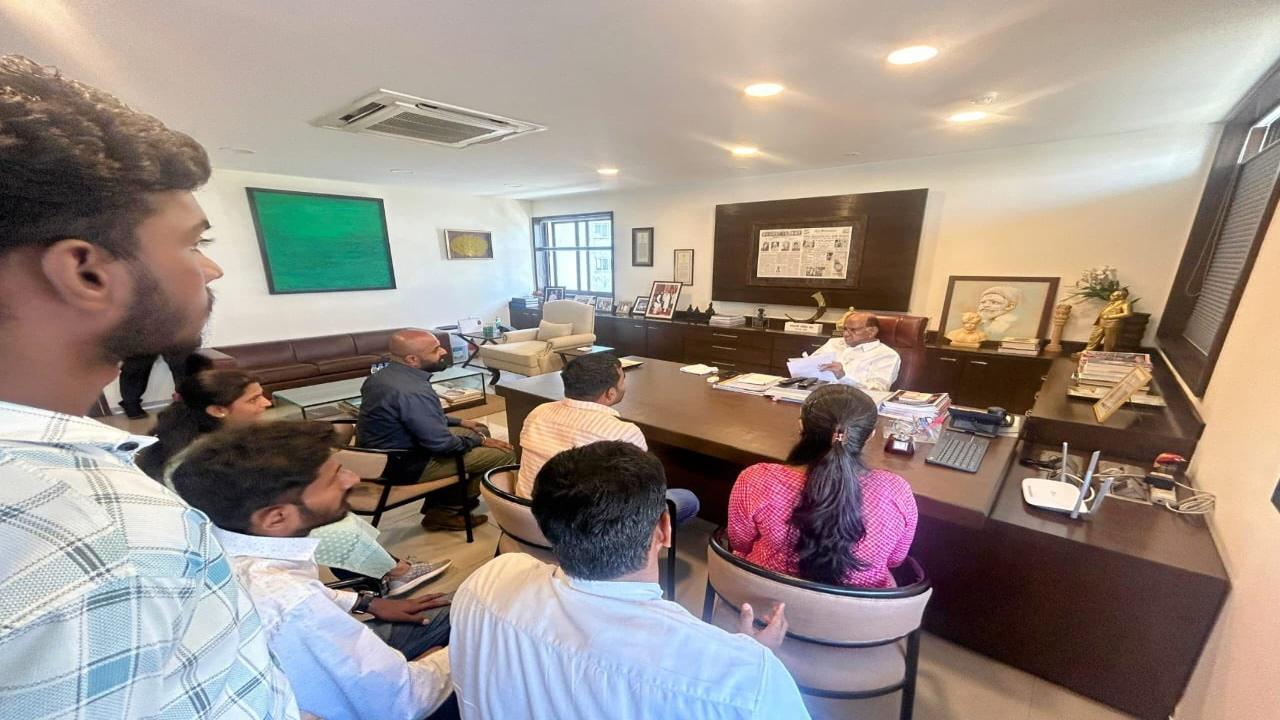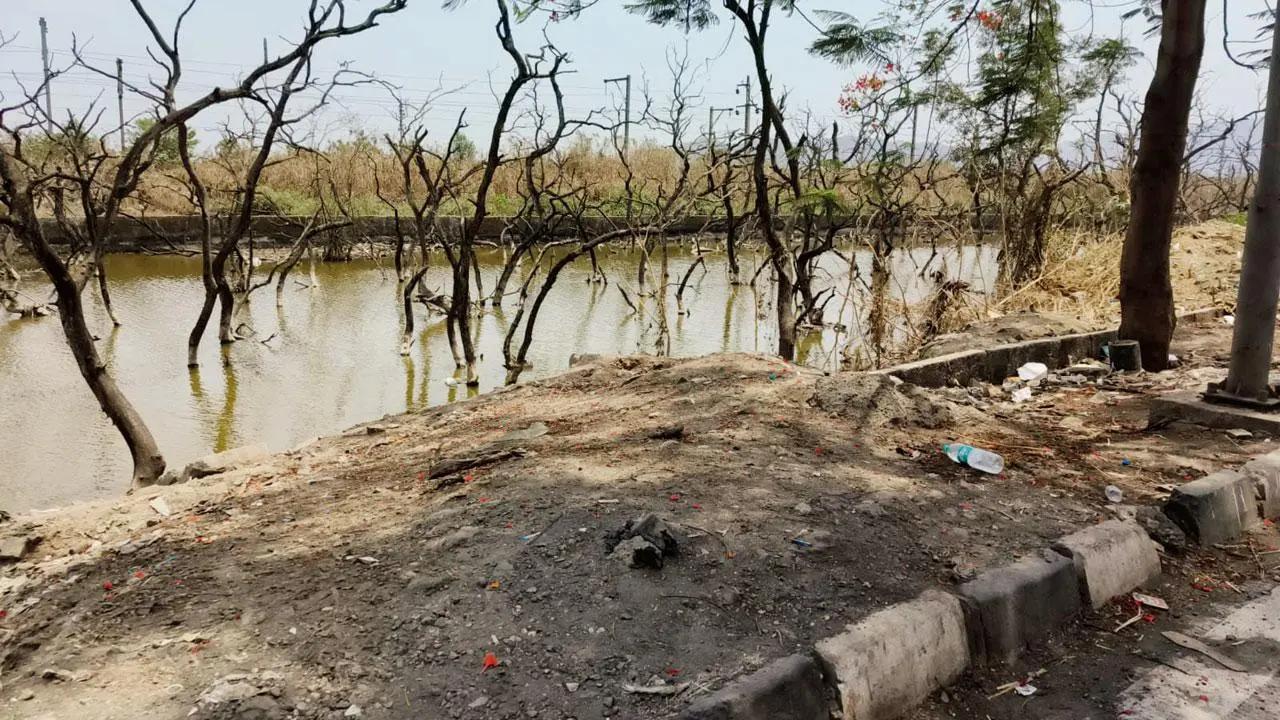Read Mumbai News
IIT-Bombay researchers develop solar evaporators for desalination
Researchers at the Indian Institute of Technology (IIT)-Bombay have developed a new material that can facilitate water desalination and help in addressing the growing freshwater crisis in the world, reported PTI. Professor Swatantra Pratap Singh and Aiswarya CL from IIT-Bombay have developed the material called the Dual-Sided Superhydrophobic Laser-Induced Graphene (DSLIG) evaporator, the institute said on Wednesday. The device addresses multiple shortcomings of earlier evaporators and has the potential for large-scale applications. This evaporator can be heated by both solar energy and also by electricity – known as Joule heating – the institute informed, according to PTI. Freshwater scarcity, a significant issue in various parts of the world, is expected to intensify in the coming years. While water is abundant on Earth's surface, only about 3 per cent of it is freshwater, and even within that, less than 0.05 per cent is easily accessible and removing salt from seawater and brackish water is seen as one of the solutions to address this problem. However, brine – concentrated salt solution – from desalination poses a major problem in landlocked places, and industries are looking for zero liquid discharge. By combining both solar and electric heating, the material is protected from fluctuations"Fluctuations in solar radiation cause temperature variations on the evaporator's surface. On cloudy days, the performance of the interfacial system is halted due to the lack of solar energy. Additionally, the variation in solar radiation during the day affects the evaporation process, with evaporation rates typically peaking around 2 pm when solar intensity is highest," Professor Singh explained, according to PTI. By combining both solar and electric heating, the material is protected from fluctuations in the availability of sunlight. When there is less or no sunlight, electricity can be used to heat the evaporator and maintain similar temperatures, ensuring consistent performance, he noted. Additionally, DSLIG has a superhydrophobic property, which means it can repel water like lotus leaves. Prof. Swatantra Pratap Singh & Aiswarya C. L. from IITB have developed a new hydrophobic graphene based material that facilitates water desalination. https://t.co/dxNmLeGeoj pic.twitter.com/5qenRXlwVc — IIT Bombay (@iitbombay) April 16, 2025 Thus, superhydrophobic materials reduce the contact area between water droplets and the material surface, making droplets roll over them instead of wetting. In desalination applications, the superhydrophobic nature of DSLIG helps prevent salt dissolved in water from sticking to the evaporator surface, thus maintaining efficiency over time. "The primary goal of our work was to create a superhydrophobic surface, exhibiting the lotus effect, capable of functioning with both solar and Joule heating," added Professor Singh. The researchers fabricated DSLIG by coating a layer of a polymer called polyvinylidene fluoride (PVDF) on one side of a thin layer of another polymer LIG, poly (ether sulfone) (PES). Graphene was then engraved on the PVDF polymer side of the material using laser-based engraving technology. Laboratory tests showed DSLIG not only exhibits lotus leaf-like behaviour, preventing salt deposition and excellent efficiency for desalination under both electric and solar heating, but is also very effective in treating extremely concentrated salt solutions. This made it an ideal candidate for treating salt water discharges from other desalination outlets as well as industrial wastewater. The researchers also found that the performance of DSLIG improved when multiple evaporators were stacked on top of each other. (With PTI inputs)
16 April,2025 08:14 PM IST | Mumbai | mid-day online correspondentTMC removes 422 illegal banners on day 2 of its special drive
The Thane Municipal Corporation (TMC) continued its special drive for the second day to remove unauthorised posters, banners, and hoardings across the city, the officials said. They said that a total of 422 illegal flex boards and hoardings were removed on the second day of action. The campaign is being carried out under the guidance of Municipal Commissioner Saurabh Rao, said an official. The anti-encroachment department, along with all ward offices, is working together to clean up the public spaces, said Deputy Commissioner (Encroachment) Shankar Patole, an official TMC statement said on Wednesday. The special drive is mainly focused on illegal banners fixed on electric poles, trees, road dividers, and pavements, all of which contribute to visual pollution in the city. Officials stated that such hoardings not only spoil the city’s appearance but can also cause accidents during storms or strong winds. Ward-wise details of action taken- - Naupada-Kopri Ward – 65 hoardings removed - Wagle Estate – 68 hoardings - Lokmanya-Savarkar Nagar – 52 hoardings - Vartak Nagar – 19 hoardings - Majiwada-Manpada – 10 hoardings - Uthalsar – 24 hoardings - Kalwa – 50 hoardings - Mumbra – 37 hoardings - Diva – 97 hoardings Meanwhile, on the first day of the drive, 665 banners, posters, hoardings, etc were been removed from across all wards. The Thane Municipal Corporation had on Tuesday said that it launched a special campaign to remove posters, banners, and illegal signboards across the city. Accordingly, all the posters, banners, and signboards that were dangerously placed on road dividers, pedestrian paths, and trees were taken off. The TMC, in a statement had earlier said that the campaign has been initiated as posters and hoardings in the city have been defacing the city. On many occasions, these hoardings collapse amid windy conditions, leading to mishaps. In light of this, Rao directed the civic body to remove all the unauthorised hoardings from the city. The campaign will be continued in the future, too, the Thane civic body informed. The civic body had said that 665 unauthorised posters and banners were taken down within a single day on Tuesday from its jurisdiction under the drive.
16 April,2025 07:38 PM IST | Mumbai | mid-day online correspondentMumbai Rains: Civic body to publish tree-pruning schedule from April 21
To ensure that citizens in Mumbai do not face inconvenience during the monsoon season, the Municipal Corporation of Greater Mumbai (MCGM) has initiated the systematic pruning of tree branches across the city. In order to keep citizens informed in advance about the tree-pruning days in their respective areas, the Garden Department of the Mumbai civic body will publish the tree-pruning schedule on the social media handles of the respective administrative ward offices as well as on their notice boards, starting April 21. Municipal Commissioner and Administrator Bhushan Gagrani and Additional Municipal Commissioner (Eastern Suburbs) Dr Amit Saini directed all the departments concerned to undertake pre-monsoon work in a timely manner and complete it within the set deadlines. Acting on these instructions, under the supervision of Deputy Commissioner (Gardens), Ajit Ambi, the Garden Department has accelerated its pre-monsoon preparations ahead of Mumbai Rains. Tree pruning within MCGM limits is carried out in accordance with the Maharashtra (Urban Areas) Protection and Preservation of Trees Act, 1975. The garden department’s pre-monsoon activities include the removal of dead or hazardous trees, pruning of unnecessary branches, removal of fruits and dried foliage, disposal of fallen trees, replanting, restoring balance to leaning trees, and spraying insecticides on roots, trunks, and leaves. If necessary, the civic body will also take assistance from Mumbai Police to execute these tasks. As part of this year’s pre-monsoon efforts, the Mumbai civic body has undertaken the pruning of branches that could pose a danger to residents. These trees are located on government premises and around various establishments. However, work is often disrupted owing the vehicles parked beneath the trees. If the vehicle owner is not present at the site, the entire operation is delayed. To avoid such disruptions, the garden department has been taking proactive measures. Jitendra Pardeshi, the superintendent of gardens, said citizens must contact their ward offices to gather relevant information and cooperate with the garden department by ensuring their vehicles are parked appropriately as per the schedule. Additionally, private housing societies have been urged to obtain prior permission from MCGM and conduct appropriate pruning of trees before Mumbai Rains.
16 April,2025 07:08 PM IST | Mumbai | mid-day online correspondentMaharashtra govt to implement new curriculum structure in phases
The Maharashtra government has approved the gradual implementation of the National Education Policy (NEP) 2020 in all schools across the state starting from this academic year 2025-26 in phase-wise, an official government notification said. The new structure aims to modernise the education system and align it with the vision of providing quality, inclusive, and affordable education to all, officials said. The NEP introduces a transformative ‘5+3+3+4’ school education structure, replacing the traditional 10+2 system. This model aligns educational stages with the developmental needs of children aged 3 to 18 years. The traditional 10+2 education model will be replaced by the 5+3+3+4 pattern, which includes: - Foundational Stage (ages 3–8): Preschool to Class 2 - Preparatory Stage (ages 8–11): Classes 3 to 5 - Middle Stage (ages 11–14): Classes 6 to 8 - Secondary Stage (ages 14–18): Classes 9 to 12 The National Council of Educational Research and Training (NCERT) has prepared National Curriculum Frameworks (NCF) for Foundational Stage (2022) and School Education (2023). These are already being used in 23 states. The textbooks developed under NCF are created with the help of renowned and experienced experts across India and are used for national-level competitive exams and in schools affiliated with various boards. Under the guidance of the State Steering Committee, which includes education experts and stakeholders, it has been decided to gradually adopt these NCERT-prepared textbooks with necessary changes and contextualisation in Maharashtra as well. A State Curriculum Framework (SCF) for School Education (2024) has been developed based on NCF 2023. The work on School Education Curriculum 2025 is currently ongoing. These frameworks — SCF Foundational 2024, Foundational Education Curriculum 2024, and SCF School Education 2024 — have been approved by the State Steering Committee under the chairmanship of the Maharashtra Minister of School Education. Under the new curriculum, for Classes 1 to 5 in Marathi and English medium schools, Hindi will be introduced as the third language. In other medium schools, students will study their medium of instruction, Marathi, and English. The State Council of Educational Research and Training (SCERT), Maharashtra has developed new curriculum frameworks based on the National Curriculum Framework (NCF) by NCERT. These will be used to create textbooks in collaboration with Balbharati, the state textbook bureau. The textbooks will be: Simple, enjoyable, and focused on building foundational literacy and numeracy. Aligned with national goals and the Sustainable Development Goals (SDG) for 2030. Supplementary materials such as workbooks and bridge courses will be developed to help students transition smoothly to the new curriculum. The SCERT will also prepare a new holistic assessment system known as the Holistic Progress Card (HPC). The schools will have timetables and annual plans, and there will be clear guidelines for exams, teacher training, and classroom activities. The state’s Steering Committee headed by the state Minister of School Education will supervise the implementation at all levels, the notification said.
16 April,2025 07:02 PM IST | Mumbai | mid-day online correspondentNagpur civic chief apologises to HC for demolishing houses of riots accused
The Nagpur civic chief, Abhijeet Chaudhari, on Wednesday issued an unconditional apology to the Bombay High Court for demolishing houses of riots accused allegedly involved in the Nagpur violence, reported the PTI. In an affidavit filed before the Nagpur bench of the Bombay High Court on Tuesday, Chaudhari explained that civic officials were unaware of the Supreme Court’s guidelines concerning the demolition of properties linked to accused individuals in such cases. Chaudhari further stated that the NMC had not received any official circular from the Maharashtra government outlining the apex court's directions on the matter. The Supreme Court had earlier mandated procedural safeguards before the demolition of properties associated with those accused of riots, and Chaudhari admitted that the NMC’s actions were carried out without knowledge of these crucial directives. According to the PTI, the Nagpur civic authorities were reportedly unaware of the Supreme Court's ruling that stipulated safeguards must be followed before demolishing the properties of individuals involved in riot cases. In his affidavit, Chaudhari explained that the NMC’s town planning department had also not been made aware of the Supreme Court's decision, which had been communicated to the chief secretaries of states and Union Territories. These chief secretaries were supposed to issue circulars to local authorities, informing them of the guidelines, but according to the NMC commissioner, no such communication had been received by Nagpur Municipal Corporation at the time of the demolitions. The controversy stems from riots that occurred in Nagpur on March 17, following rumours regarding the burning of a ‘chadar’ with holy inscriptions during protests led by the Vishwa Hindu Parishad (VHP). The protests were aimed at seeking the removal of Mughal emperor Aurangzeb’s tomb in Chhatrapati Sambhajinagar district. Subsequently, two individuals – Fahim Khan, a key accused in the violence, and Yusuf Sheikh had their properties targeted for demolition. On March 24, the Nagpur bench of the Bombay High Court intervened, issuing a stay on the demolition of their homes. The court criticised the authorities for their high-handedness, particularly highlighting the demolition of Khan’s two storey house, which was razed before the court’s order was issued. The demolition of parts of Sheikh’s house was halted after the court’s intervention. In his apology, Chaudhari acknowledged that the NMC had acted in contravention of the Supreme Court’s guidelines but emphasised that this was due to a lack of knowledge, not intentional malice. He further stated that neither the NMC nor its officers had acted with any ill intent but had followed the prevailing statutory provisions, such as those under the Slum Act of 1971, based on the information they had at the time. The High Court has now granted the Maharashtra government two weeks to respond to the matter and provide clarification on the issue. (With inputs from PTI)
16 April,2025 06:15 PM IST | Mumbai | mid-day online correspondentRoad concretisation: BMC begins crackdown on substandard works
A day after Maharashtra deputy CM Eknath Shinde along with BMC chief Bhushan Gagrani reviewed Mumbai road concretisation, the Brihanmumbai Municipal Corporation (BMC) on Wednesday began a crackdown on substandard works in city, the officials said. They said that the Mumbai civic body has taken strict action against contractors and suppliers involved in substandard concrete road work. It is part of BMC’s larger effort to make Mumbai roads pothole-free by speeding up high-quality cement concretisation across the city, the officials said. BMC chief Bhushan Gagrani has clearly stated that no negligence or poor-quality work will be tolerated, an official statement said. The contractors and agencies found guilty of delays or poor work will face heavy penalties and bans, it said. The statement said that a contractor working in Aarey Colony faced serious delays and poor quality in roadwork. As a result, the contractor has been banned from participating in any BMC tender for the next 2 years and fined Rs 5 lakh. It said that two ready-mix concrete (RMC) plants were found to have failed quality checks (slump test mismatches). Their registrations have been cancelled, and they are barred from supplying concrete for any BMC work for 6 months. It further said that two road contractors were also fined Rs 20 lakh each for substandard work. The officials said that strict micro-planning to complete all concrete road work by May 31, 2025. They said that the deadlines for each road project has been fixed and instructions to have compulsory presence of engineers on site during construction has been given. The Mumbai civic officials are also conducting surprise inspections during the ongoing works. Additional Municipal Commissioner (Projects) Abhijit Bangar has been actively inspecting ongoing work. On 20 March 2025, he visited a site in M-East ward and found a mismatch in slump test results—an important test to measure the quality of concrete. The concrete mix was rejected, and the RMC supplier fined Rs 20 lakh and blacklisted for 6 months. On 1 April 2025, he visited another site on Jail Road in B ward, where again, poor quality concrete was detected. The slump test showed a massive difference between the RMC plant and the actual site. The responsible contractor was fined Rs 20 lakh, and the RMC plant was blacklisted for 6 months, it said. The official statement said that the slump tests measure the workability of concrete—especially the ratio of water to cement. If there is too much water, the concrete becomes weak, affecting the durability and quality of the roads. The BMC has made it mandatory to conduct slump tests both at the RMC plant and at the construction site.
16 April,2025 05:34 PM IST | Mumbai | mid-day online correspondentCentral Railway introduces 14 new AC local train services in Mumbai
On the occasion of the 172nd anniversary of the Indian Railways on Wednesday, Central Railway (CR) rolled out 14 new air-conditioned local train services on its Mumbai main line, offering much-needed relief to commuters amid the summer heat, reported PTI. According to Swapnil Nila, Chief Public Relations Officer of Central Railway, seven out of the 14 newly introduced AC services were operated by the afternoon, while the remaining trains are scheduled to run later in the day. As per PTI, the new services replaced existing non-AC services. With this, the number of AC services on the CR's main line rose to 80 from 66. The replacement of ordinary non-AC services by AC services, especially during peak morning and evening hours, had caused resentment among a section of commuters in the past, as the fare of these trains is much higher. The new AC local services will be operated from Monday to Saturday, reported PTI. Every day, the CR operates a total of 1,810 suburban services and ferries more than 35 lakh commuters on its Main, Harbour, Trans-Harbour and Belapur-Uran suburban lines. The first passenger train in India ran on this day 172 years ago from Bori Bunder (present-day Chhatrapati Shivaji Maharaj Terminus, Mumbai) to Thane. On the occasion, Railway Minister Ashwini Vaishnaw took to X and wrote, "The railway in India began 172 years ago, on April 16, 1853. It was a historic day for Mumbai. A public holiday was declared to mark the occasion. That day, at exactly 3:35 PM, with a 21-gun salute, a train with 14 carriages departed from Bori Bunder to Thane for the first time, carrying 400 passengers on board. The train was pulled by three engines named ‘Sindh,’ ‘Sultan,’ and ‘Sahib.’ It travelled the 34-kilometre journey in 1 hour and 15 minutes. Since then, Indian Railways has remained dedicated to serving the nation." 172 वर्ष पहले भारत में रेल (Rail) की शुरुआत 16 अप्रैल 1853 को हुई। मुम्बई में वह दिन ऐतिहासिक था। उस दिन वहाँ सार्वजनिक अवकाश घोषित कर दिया गया था। उस दिन दोपहर तीन बजकर पैंतीस मिनट पर 21 तोपों की सलामी के साथ बोरीबंदर से ठाणे के लिए पहली बार 14 डिब्बों की एक ट्रेन रवाना हुई थी।… pic.twitter.com/IFEJupTz3W — Ashwini Vaishnaw (@AshwiniVaishnaw) April 16, 2025 (With PTI inputs)
16 April,2025 05:31 PM IST | Mumbai | mid-day online correspondentPandit Deendayal Upadhyay festival: Maharashtra govt announces ‘Ideal Village’
The Maharashtra government on Wednesday will celebrate the Pandit Deendayal Upadhyay Festival across the state and during the festival, it has planned to introduce the ‘Ideal Village’ concept, an official statement said. The festival will be celebrated from April 22 to April 25, 2025 and will focus on rural development, skill training, and inclusive growth, it said. The statement said that the Skill Development Minister Mangal Prabhat Lodha announced that all Maharashtra government departments, along with district administrations, have been asked to participate actively to ensure the success of the event. As part of the celebration, the concept of ‘Ideal Village’ will be implemented, the officials said. The state Skill Development, Entrepreneurship, and Innovation Minister Mangal Prabhat Lodha has instructed all state departments and district-level authorities to ensure the successful execution of the event, they said. The official statement said that a Pandit Deendayal Upadhyay festival committee has been formed by the state government to oversee the festival. The festival is based on Pandit Deendayal Upadhyay’s philosophy of Antyodaya, which aims to uplift the last person in society, it said. "A meeting regarding the preparations was recently held at the Mantralaya under the leadership of Chief Secretary Sujata Saunik, where Lodha, along with top officials from various departments such as Skill Development, Tribal Development, Tourism, Women and Child Welfare, and Education, were present. District Collectors from all over the state also joined the meeting via video conferencing," the statement said. Sujata Saunik emphasised that district collectors must form local-level committees as per government guidelines to ensure the festival’s success in every district, the official statement said. It said that Maharashtra will be the first state in the country to begin celebrations of this kind, Lodha said during the meeting. A special state-level committee has been formed for the festival, with Lodha being the chairperson, the statement said. It further said that to spread awareness among students and citizens, the government will distribute one lakh booklets based on Pandit Upadhyay’s thoughts and philosophy in each district. The festival will also promote skill development activities in rural schools, Anganwadis, and self-help groups, it said.
16 April,2025 05:11 PM IST | Mumbai | mid-day online correspondentSharad Pawar to write to CM as MPSC aspirants meet him, demand more vacancies
NCP (SP) President Sharad Pawar has justified the demand of government job aspirants to increase the number of vacancies for the Joint Preliminary Examination Combine (JPE) being conducted by the Maharashtra Public Service Commission (MPSC) after two years, news agency PTI. He assured a delegation of aspirants preparing for JPE on Tuesday that he would raise their grievances with Chief Minister (CM) Devendra Fadnavis. The JPE Combine refers to a common preliminary exam held by MPSC to fill multiple positions, including those of the police sub-inspector (PSI), state tax inspector (STI), and assistant section officer (ASO). The exam is tentatively scheduled for September, reported PTI. "The students of the Joint Preliminary Examination (#combine ) met yesterday at the Yashwantrao Chavan Center in Mumbai regarding the increase in seats for their examination. This examination is being held after two years. Therefore, if the benefit of the age increase decision taken by the Commission is to be extended to these students, the advertisement of 480 seats i.e. (PSI 216, STI 209, ASO 55, SR 0) is scanty," Pawar stated in a post on social media platform X. Justifying the aspirants' demand to increase the number of vacancies, the Nationalist Congress Party (Sharadchandra Pawar) chief said, "In such a situation, the demand of the students to increase the seats is justified. Since all these seats are vacant in large numbers, there is no reason for the government and the commission to have any problem in increasing the seats. In this regard, I will personally send a letter to the Chief Minister and will also contact him on the phone today." The delegation demanded that aspirants be given sufficient time to prepare for the State Services Main Examination 2024, reported PTI. "It is also a strong demand of the students that they should be given sufficient time to prepare for the State Services Main Examination 2024. When I spoke to the Commission Chairman in this regard two days ago, the Commission had asked to send a delegation of students on April 15. But the said meeting could not be held yesterday for some reason. The students have brought to their attention that this meeting will be held today," the former Union Minister said, adding that MPSC should consider the students' demand sympathetically and "take a positive decision". (With PTI inputs)
16 April,2025 04:20 PM IST | Mumbai | mid-day online correspondentMangrove Cell orders restoration after illegal land reclamation in Borivali
In a decisive move to safeguard Mumbai’s fragile coastal ecosystem, the Maharashtra government’s Mangrove Cell has issued directives to remove illegal encroachments and restore damaged mangrove cover in two areas of Borivali west. The decision follows detailed site inspections which revealed unauthorised land reclamation and destruction of ecologically sensitive zones. According to PTI, teams comprising officials from the Forest and Revenue Departments, the Mangrove Cell, and local administrative bodies surveyed sites in Chikuwadi and Eksar villages after receiving formal complaints of illegal activities in designated green zones. The first inspection, conducted on 11 April, was prompted by a complaint from former BJP MP Kirit Somaiya, who was present during the site visit. officials identified landfilling, encroachments, and the unauthorised use of green zone land for temporary film sets and shoots, activities carried out without required clearances. The surveyed area was found to be within 50 metres of officially demarcated mangrove zones, as verified by satellite imagery and mapping data from the Maharashtra Remote Sensing Application Centre (MRSAC) for the years 2005 and 2018. The inspection team confirmed violations of the Environment (Protection) Act, 1986, and recommended immediate removal of illegal structures and restoration of the mangrove ecosystem. The findings were submitted to higher authorities for further legal action. A second inspection, carried out last week in Eksar village, revealed similar issues on two private plots. The complaint also filed by Somaiya, alleged that nearly 30 acres of mangrove buffer land had been illicitly reclaimed by dumping debris. The Mumbai Suburban Collector’s office confirmed that one plot, enclosed by tin sheets and filled with construction debris, belonged to a private developer. Satellite data again verified the area was part of the 50-metre mangrove buffer, and that mangroves and mudflats had once existed there. The second parcel, also falling within the protected buffer, had reportedly been filled using mud, murum, and other debris. Both sites showed significant mangrove degradation, PTI states. The latter plot, as mentioned in the government order dated 15 April, is owned by prominent Mumbai-based real estate developer Niranjan Lakhumal Hiranandani. The Mangrove Cell has urged the state environment department and the Brihanmumbai Municipal Corporation (BMC) to initiate a comprehensive investigation under the Environment (Protection) Act. Officials have also been instructed to register offences under relevant environmental laws. (With inputs from PTI)
16 April,2025 02:18 PM IST | MumbaiLadki Bahin Yojana to continue, no question of scrapping it: Ajit Pawar
Maharashtra Deputy Chief Minister Ajit Pawar has said the government's flagship Ladki Bahin Yojana to provide financial assistance to women will continue and that there is no question of scrapping it, reported news agency PTI. Under the Mukhyamantri Majhi Ladki Bahin Yojana, which is believed to have played a key role in the victory of the ruling Mahayuti (comprising the BJP, Shiv Sena and Ajit Pawar's NCP) in the state polls last year, women are provided Rs 1,500 every month. Talking to reporters on Tuesday night, Pawar, who is also the state's finance minister, said, "The budgetary allocation for the implementation of the scheme has been made and there is no question of scrapping it." Earlier, state Women and Child Development Minister Aditi Tatkare on Tuesday said no change has been made in the amount of assistance paid under the Ladki Bahin Yojana, but some 7.74 lakh women already getting Rs 1,000 under another scheme are being paid the difference of Rs 500, reported PTI. She was responding to media reports claiming the aid under the Ladki Bahin scheme was reduced for 7,74,148 women who were receiving benefits from other schemes. Rs 1,500 per month are paid under the Ladki Bahin Yojana to women who are not taking advantage of any other government scheme. To those who are receiving a benefit of less than Rs 1,500 under other schemes, the difference is paid under the Ladki Bahin Yojana, Tatkare said, reported PTI. In line with this policy, the difference of Rs 500 is being paid to 7,74,148 women who are receiving Rs 1,000 per month under the Namo Shetkari Samman Yojana, the NCP leader said in a post on X. "No eligible woman has been excluded from the Ladki Bahin scheme, and no change has been made in the said process after July 3, 2024," Tatkare said, adding she has clarified about the same during the budget session of the state legislature. The opposition was constantly spreading misinformation about the scheme and its leaders either have a poor understanding of administrative matters or their morale has been hit by the success of the scheme, she claimed. (With inputs from PTI)
16 April,2025 01:21 PM IST | Mumbai | mid-day online correspondent













